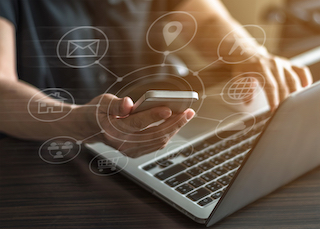 A new study published in PLOS ONE looked at personal resources to mitigate the dark side of digital working.
A new study published in PLOS ONE looked at personal resources to mitigate the dark side of digital working.
“The study focused on the personal resources of mindfulness and digital confidence and ways in which these resources can help to reduce negative well-being impacts from working digitally,” study author Elizabeth Marash told us. “We aimed to understand how experiences such as technology-related stress, anxiety and overload might manifest in higher burnout and poorer health.”
Researchers also wanted to see whether workers who feel more confident with technology and those who use it more mindfully would be better protected in terms of their well-being.
There is now a considerable evidence base showing that mindfulness can reduce stress and protect well-being in the workplace, however few studies have looked specifically at whether it can be helpful in a digital work context. Drawing on this wider literature and a few preliminary studies, the research team hypothesized that mindfulness would convey protective effects for digital workers.
“With many more workers using technology to support remote and hybrid work styles since the pandemic, it’s critical that researchers and organizations understand both the benefits and the pitfalls of using the technology,” Marash told us. "By growing our knowledge in this area, we are all better placed to develop principles and practices that enable us to live healthy digital working lives.”
This is the topic of the principal researcher’s PhD investigations. All authors are interested in the psychology of technology and PhD student Elizabeth Marsh has worked for many years with organizations implementing digital workplace technology – as well as teaching mindfulness in the workplace. She brought these interests together in her Phd.
“We conducted a survey of 142 workers across different workplaces in the UK and followed up with interviews with 14 workers,” Marash told us. “In the survey we measured areas such as mindfulness, digital confidence, technostress, burnout and health. In the survey we were able to probe workers’ technology experiences more deeply and extend our understanding of how mindfulness and digital confidence can help protect well-being.”
Negative technology experiences among the workers we studied did have a negative impact on well-being. In particular, stress and Fear of Missing Out (FoMO) in relation to workplace technology were associated with higher burnout and poorer health. Digital workplace confidence was helpful in protecting well-being in relation to anxiety-related aspects of digital working; mindfulness had a wider effect, protecting against technology-related stress, anxiety, FoMO and overload. Interview data indicated that a mindful orientation to the digital workplace could help minimize negative well-being impacts; while being more digitally confident supported a sense of agency and changing digital habits for the better.
“The standout finding was that mindfulness had a larger protective effect than digital confidence for protecting worker well-being in a digital workplace context,” Marash told us.
“This suggests that while it’s important to develop digital skills, it may be even more important to help workers foster a mindful approach to using technology. For instance, learning how to minimise interruptions, set boundaries around technology usage, take a break from technology."
The results indicate the value of fostering these two personal resources in the workplace. They also suggest the value of researchers continuing to pursue this topic and understand more about the effects the researchers saw, for example over time (longitudinal studies) and in practice (intervention studies).
“These results need to be put in a wider context: organizations and technology vendors still need to build usable, accessible, and inclusive digital workplaces – mindfulness can’t fix bad technology,” Marash told us. “But all of us can do something to protect our well-being when working digitally – and organizations can help their employees in this respect with training and guidance.”
Patricia Tomasi is a mom, maternal mental health advocate, journalist, and speaker. She writes regularly for the Huffington Post Canada, focusing primarily on maternal mental health after suffering from severe postpartum anxiety twice. You can find her Huffington Post biography here. Patricia is also a Patient Expert Advisor for the North American-based, Maternal Mental Health Research Collective and is the founder of the online peer support group - Facebook Postpartum Depression & Anxiety Support Group - with over 1500 members worldwide. Blog: www.patriciatomasiblog.wordpress.com
Email: tomasi.patricia@gmail.com